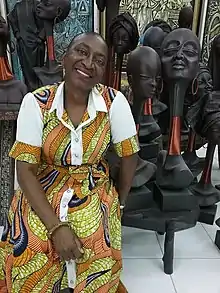Oyeronke Oyewumi
Oyèrónkẹ́ Oyèwùmí is a Nigerian gender scholar and full professor of sociology at Stony Brook University. She acquired her bachelor's degree at the University of Ibadan in Ibadan, Nigeria and went on to pursue her graduate degree in Sociology at the University of California, Berkeley.[1]
Oyèrónkẹ́ Oyèwùmí | |
|---|---|
 Oyèrónkẹ́ Oyèwùmí | |
| Nationality | Nigerian |
| Occupation | Gender scholar and professor |
Oyewumi's interdisciplinary work foregrounds an African vantage point that remains largely underrepresented in academia. Much of her academic research and writing has used African experiences to illuminate theoretical questions pertinent to a wide range of disciplines including sociology, political science, women studies, religion, history, and literature, all in an effort to broaden scholarly understanding to include non-Western cultures. In all of her work, Oyeronke Oyewumi attempts to provide a more nuanced understanding of these societies, thereby avoiding reductionist formulations.
In her 1997 monograph, The Invention of Women: Making an African Sense of Western Gender Discourses, she offers a postcolonial feminist critique of Western dominance in African studies.[2] She explains that in spite of vast amounts of academic research claiming otherwise, the stratification of gender in Yoruba culture is entirely a colonial legacy.[3] The book won the American Sociological Association's 1998 Distinguished Book Award in the Gender and Sex category.[4]
The Invention of Women
In the Invention of Women, Oyewumi presents modern Yoruba gender stratification as a Western colonial construct. Through this deconstruction, she introduces an alternate method of understanding both Western and Yoruba cultures.[3]
She begins by naming biological determinism as central to Western understanding of gender.[3] This idea that biological differences serve as an organizing principle for societies is a Western philosophy that doesn't transfer to Yoruba societies which do not use the body as the basis for any social roles.[3] Nonetheless, Oyewumi explains how colonial institutions went onto impose this biological understanding of gender onto the Yoruba. Additionally, she tackles the incongruities in feminist theory that assert gender as a social construct and the subjugation of women as universal. Oyewumi argues to the contrary that gender was never socially constructed in Yoruba society and relative age was instead the main organizing principle.[3]
'If anything, my work is the ultimate evidence about the fact that gender is indeed socially constructed. It didn't come from heaven, it didn't come from nature, there are these categories that are created, historically and culturally. What my work actually does is to affirm the idea that gender is socially constructed'.[5]
According to Nigerian writer Bibi Bakare-Yusuf, while Oyewumi's work rightfully challenges gender stratification as a Western import, her conclusion is based on the faulty reasoning of language determinism. Oyewumi heavily relies on the lack of gendered expressions and the overwhelming presence of age expressions in Yoruba language to prove that these categorizations are respectively familiar and unfamiliar to this society. However, Bakare-Yusuf argues that the threat of mistranslation works both ways. Just as there are less systems of gendering among the Yoruba, there could be less systems of ageing in Western cultures. Oyewumi's work should serve as a naming of culturally specific systems but not as a testimony that these systems cannot be exchanged and translated.[6]
Works
- Oyèwùmí, Oyèrónkẹ́ (1997). The Invention of Women: Making an African Sense of Western Gender Discourses. Minneapolis: University of Minnesota Press. ISBN 978-0-8166-2441-6.
- Oyèwùmí, Oyèrónkẹ́ (2003). African Women and Feminism: Reflecting on the Politics of Sisterhood. Trenton, NJ: Africa World Press. ISBN 978-0-86543-628-2.
- Oyěwùmí, Oyèrónkẹ́ (2010). Gender Epistemologies in Africa: Gendering Traditions, Spaces, Social Institutions, and Identities. New York: Palgrave Macmillan. ISBN 978-0-230-62345-3.
- Oyěwùmí, Oyèrónkẹ́ (2016). What Gender is Motherhood? Changing Yorùbá Ideals of Power, Procreation, and Identity in the Age of Modernity. New York: Palgrave Macmillan. ISBN 978-1-137-53877-2.
Books
- Gender Epistemologies in Africa: Gendering Traditions, Spaces, Social Institutions and Identities (edited), Palgrave (2011).
- African Gender Studies Reader (edited), Palgrave: New York (2005).
- African Women and Feminism: Reflecting on the Politics of Sisterhood (edited), Africa World Press, Trenton: New Jersey (2003).
- The Invention of Women: Making an African Sense of Western Gender Discourses, University of Minnesota Press, Minneapolis.
Fellowships and Awards
Notes
- "Oyeronke Oyewumi | Department of Sociology". www.stonybrook.edu. Retrieved 2019-10-27.
- The Invention of Women.
- Oyěwùmí, Oyèrónkẹ́. (1997). The invention of women : making an African sense of Western gender discourses. Minneapolis: University of Minnesota Press. ISBN 978-0-8166-8590-5. OCLC 290518706.
- "Sex and Gender Recipients History". American Sociological Association. 2011-03-07. Retrieved 2019-10-27.
- Oyeronke Oyewumi. "SON[I]A #303. Oyèrónké Oyèwùmi (podcast)".
- Bakare-Yusuf, Bibi. ""Yorubas Don't Do Gender": A Critical Review of Oyeronke Oyewumi's The Invention of Women: Making an African Sense of Western Gender Discourses". Cite journal requires
|journal=(help) - "Herskovitts Award Winners". 2013-05-02.